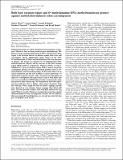Both base excision repair and O-6-methylguanine-DNA methyltransferase protect against methylation-induced colon carcinogenesis
Author(s)
Samson, Leona D.; Wirtz, Stefan; Nagel, Georg; Eshkind, Leonid; Neurath, Markus F.; Kaina, Bernd; ... Show more Show less
DownloadSamson-2010-Both base excision repair.pdf (864.3Kb)
OPEN_ACCESS_POLICY
Open Access Policy
Creative Commons Attribution-Noncommercial-Share Alike
Terms of use
Metadata
Show full item recordAbstract
Methylating agents are widely distributed environmental carcinogens. Moreover, they are being used in cancer chemotherapy. The primary target of methylating agents is DNA, and therefore, DNA repair is the first-line barrier in defense against their toxic and carcinogenic effects. Methylating agents induce in the DNA O[superscript 6]-methylguanine (O[superscript 6]MeG) and methylations of the ring nitrogens of purines. The lesions are repaired by O[superscript 6]-methylguanine-DNA methyltransferase (Mgmt) and by enzymes of the base excision repair (BER) pathway, respectively. Whereas O[superscript 6]MeG is well established as a pre-carcinogenic lesion, little is known about the carcinogenic potency of base N-alkylation products such as N3-methyladenine and N3-methylguanine. To determine their role in cancer formation and the role of BER in cancer protection, we checked the response of mice with a targeted gene disruption of Mgmt or N-alkylpurine-DNA glycosylase (Aag) or both Mgmt and Aag, to azoxymethane (AOM)-induced colon carcinogenesis, using non-invasive mini-colonoscopy. We demonstrate that both Mgmt- and Aag-null mice show a higher colon cancer frequency than the wild-type. With a single low dose of AOM (3 mg/kg) Aag-null mice showed an even stronger tumor response than Mgmt-null mice. The data provide evidence that both BER initiated by Aag and O[superscript 6]MeG reversal by Mgmt are required for protection against alkylation-induced colon carcinogenesis. Further, the data indicate that non-repaired N-methylpurines are not only pre-toxic but also pre-carcinogenic DNA lesions.
Date issued
2010-08Department
Massachusetts Institute of Technology. Center for Environmental Health Sciences; Massachusetts Institute of Technology. Department of Biological EngineeringJournal
Carcinogenesis
Publisher
Oxford University Press
Citation
Wirtz, S. et al. “Both base excision repair and O6-methylguanine-DNA methyltransferase protect against methylation-induced colon carcinogenesis.” Carcinogenesis 31 (2010): 2111-2117. Web. 2 Nov. 2011.
Version: Author's final manuscript
ISSN
0143-3334
1460-2180